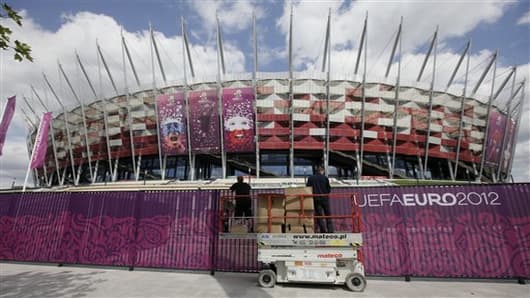Poland's bond market, which saw record inflows last year – with foreign investors raising their holdings of local-currency government debt by $15 billion – is no longer appealing, according to Bartosz Pawlowski, head of Central and Eastern Europe strategy at BNP Paribas.
"Last year, we had an epic inflow to the Polish bond market, legendary," said Pawlowski, "and yet the Polish currency was unable to strengthen. And it's difficult to imagine this inflow repeats itself."
Poland's zloty has been relatively unchanged against the dollar over the past year, as the economy has continued to slow. Poland's gross domestic product (GDP) increased 1.1 percent on an annual basis in the fourth quarter of 2012, latest data showed on Friday, slower than the 1.4 percent increase seen in the third quarter.
(Read more: Eastern Europe 'Held Hostage' by German Slowdown)
The economy has been hit by a slowdown in domestic demand, which makes up 60 percent of GDP, as well as weakness in exports, which make up the rest. The slowdown follows a massive public investment program to build stadiums and infrastructure ahead of the European football championship in 2012. At the same time, according to Pawlowski, Polish consumers are unwilling to spend.
"It is a domestically driven slow-down," said Pawlowski. "Which means that even if Germany continues to expand and Europe finds growth, it is not obvious that Poland follows through."
Given slower growth, Pawlowski believes the 4 percent yield on the 10-year government bond isn't attractive any more.
For emerging market investors, the BNP strategist recommends shorting the Polish zloty and buying the Russian ruble.
Pawlowski doesn't expect the Polish economy to blow up, but his stance is based on the opportunity cost of investing money in Poland.
"When buying Poland, you are forfeiting quite a lot of yield at other places," he said, pointing out that yields in other emerging markets such as Hungary are higher.
(Read more: Euro Zone's Poster-Child Faces a New Crisis)
Nicholas Spiro, founder of Spiro Sovereign Strategy, told CNBC that "the Polish monetary policy lost credibility, as they should have cut rates earlier, when Poland started to show signs of slowing down."
"The story in Poland was the domestic resilience. Poland weathered the storm largely because of the internal resilience of its economy – because of its very strong domestic consumer base," he added, pointing to the country's almost-40-million-strong population.
"Poland will certainly avoid a technical recession," said Spiro. "There is a lot of froth, but no bubble."


